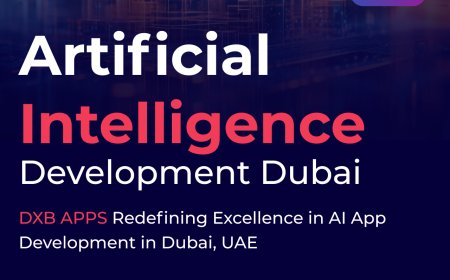What Skills Are Essential for a Career in AI Development?
Pursuing a career in AI development requires a unique blend of technical expertise, analytical thinking, and creative problem-solving.

Artificial Intelligence (AI) is revolutionizing industries, reshaping business models, and transforming how we live and work. As AI continues to integrate into every aspect of modern life, the demand for skilled professionals in AI development is soaring. Whether you're a student, developer, or career switcher, entering the AI field requires more than just curiosityit demands a strong foundation of technical and analytical skills, paired with the adaptability to keep pace with rapid advancements.
In this blog, well explore the most essential skills needed for a career in AI development, covering both hard and soft skills, and providing guidance on how to acquire them to thrive in this high-growth field.
Why AI Development Is a Career of the Future
AI is no longer a niche area reserved for research labs. It's now integral to sectors like healthcare, finance, education, marketing, cybersecurity, and autonomous systems. According to multiple global reports, AI and machine learning roles are among the fastest-growing tech jobs today, with increasing opportunities for developers, researchers, engineers, and specialists.
To succeed in AI development, professionals must not only understand how AI works but also how to build, train, deploy, and maintain intelligent systems.
Lets dive into the core skill sets required.
1.Proficiency in Programming Languages
At the heart of AI development is coding. You need to know how to write efficient, readable, and scalable code to build AI models and applications.
Essential Programming Languages:
-
Python: Widely used for AI due to its simplicity, extensive libraries (like TensorFlow, PyTorch, Scikit-learn, Keras), and strong community support.
-
R: Preferred in data science and statistical analysis.
-
Java & C++: Useful for performance-heavy applications like real-time AI systems and robotics.
-
JavaScript: Increasingly used for deploying AI models in web environments using libraries like TensorFlow.js.
Tip: Start with Pythonit offers the best entry point for AI development with extensive tutorials and community support.
2.Strong Foundation in Mathematics and Statistics
AI development is deeply rooted in mathematical concepts. To build and understand machine learning models, you must be comfortable with:
-
Linear Algebra: Vectors, matrices, and operationsfundamental for neural networks and deep learning.
-
Probability and Statistics: For making predictions, assessing model accuracy, and understanding data distributions.
-
Calculus: Especially differential calculus, which is vital in understanding backpropagation in neural networks.
-
Discrete Mathematics: Useful in algorithm design, graph theory, and logic operations.
Tip: Khan Academy, Coursera, and MIT OpenCourseWare offer excellent free resources to build these foundations.
3.Machine Learning and Deep Learning Expertise
Understanding how machines learn from data is central to AI development. This includes:
-
Supervised and Unsupervised Learning: Algorithms like linear regression, decision trees, K-means clustering, etc.
-
Neural Networks and Deep Learning: Knowledge of architectures like CNNs (Convolutional Neural Networks), RNNs (Recurrent Neural Networks), and transformers is essential.
-
Model Training and Evaluation: Techniques like cross-validation, bias-variance tradeoff, overfitting, and underfitting.
Familiarity with deep learning frameworks like TensorFlow, PyTorch, and Keras is also critical for building complex models.
4.Data Handling and Data Engineering Skills
Data is the fuel for AI. The ability to collect, clean, process, and manipulate data is a key skill.
Important Data Skills:
-
Data Preprocessing: Handling missing values, normalization, transformation.
-
Exploratory Data Analysis (EDA): Using tools like Pandas, NumPy, and Matplotlib to understand data patterns.
-
Big Data Technologies: Exposure to platforms like Hadoop, Spark, and Kafka is useful for working with large-scale datasets.
Tip: Learn SQL for querying databases, and consider mastering data visualization tools like Tableau or Power BI for insights.
5.Natural Language Processing (NLP) and Computer Vision (CV)
As specialization becomes more important, many AI developers focus on key subfields like NLP and CV.
Natural Language Processing:
-
Tokenization, part-of-speech tagging, sentiment analysis, and text classification.
-
Libraries: NLTK, SpaCy, Hugging Face Transformers.
Computer Vision:
-
Image classification, object detection, facial recognition.
-
Libraries: OpenCV, TensorFlow, PyTorch.
Having skills in one or both of these areas expands your ability to work on cutting-edge applications like chatbots, translation systems, or autonomous vehicles.
6.Understanding of Algorithms and Data Structures
Strong algorithmic thinking helps AI developers write optimized and scalable code.
Key Topics:
-
Searching and sorting algorithms
-
Trees, graphs, and hash maps
-
Dynamic programming
-
Complexity analysis (Big O notation)
These are especially important for developing custom ML algorithms or optimizing performance in production environments.
Tip: Practice problem-solving on platforms like LeetCode, HackerRank, or Codeforces.
7.Software Development Practices
AI development isnt isolatedits part of a larger software ecosystem. Knowing how to write production-level code and collaborate in a team is crucial.
Relevant Skills:
-
Version control using Git
-
Object-oriented programming (OOP)
-
APIs and web frameworks (like Flask or FastAPI)
-
CI/CD pipelines
-
Cloud deployment (AWS, GCP, Azure)
Being able to move from research notebooks to deployable applications is what sets great AI developers apart.
8.AI Ethics and Responsible AI Development
With great power comes great responsibility. As AI shapes decisions in healthcare, finance, and policing, understanding ethical principles is non-negotiable.
Key Considerations:
-
Bias in training data and algorithms
-
Fairness and transparency in decision-making
-
Privacy and data security
-
Model explainability and accountability
Developers must be mindful of the social and ethical implications of the systems they create.
Tip: Follow frameworks like Microsofts Responsible AI and Google's AI Principles.
9.Soft Skills: Communication and Collaboration
AI developers often work in cross-functional teams that include data scientists, product managers, business stakeholders, and engineers.
Essential Soft Skills:
-
Communication: Explaining complex models and results to non-technical audiences.
-
Collaboration: Working effectively in agile or scrum-based environments.
-
Problem-Solving: Being able to troubleshoot model performance, data issues, or infrastructure problems.
-
Curiosity and Lifelong Learning: AI is fast-evolvingdevelopers must constantly learn and adapt.
Being a great AI developer means not only writing code but also understanding user needs and communicating value effectively.
10.Domain Knowledge (Optional but Powerful)
AI becomes more powerful when tailored to specific domains. Having contextual knowledge can make you a more effective AI practitioner.
-
Healthcare: Medical terminology, patient data regulations.
-
Finance: Risk modeling, fraud detection systems.
-
Retail: Customer segmentation, inventory optimization.
-
Marketing: Personalization, sentiment analysis.
Combining AI expertise with domain understanding can lead to more innovative and practical solutions.
How to Start Building These Skills
If you're serious about a career in AI development, heres a structured path to build your skill set:
1. Learn the Fundamentals:
-
Take online courses in Python, machine learning, and mathematics.
-
Recommended platforms: Coursera (Andrew Ngs ML course), Udacity, edX, Fast.ai.
2. Work on Projects:
-
Build and train your own ML models.
-
Start with simple projects like spam classifiers, movie recommendation engines, or image classifiers.
3. Contribute to Open Source:
-
Platforms like GitHub are filled with AI projects. Contributing helps you learn collaboration, coding practices, and real-world problem solving.
4. Participate in Competitions:
-
Kaggle is a great place to sharpen your skills through real-world datasets and competitions.
5. Build a Portfolio:
-
Showcase your AI work on GitHub and LinkedIn.
-
Create a blog or personal website explaining your projects.
6. Stay Updated:
-
Follow AI news, research papers (via arXiv or Google Scholar), and blogs like Towards Data Science.
Conclusion
AI development is an exciting, high-impact career that combines technology, creativity, and problem-solving. To succeed in this field, you need a balanced mix of technical expertise, domain understanding, and a passion for continuous learning. From mastering Python and machine learning frameworks to understanding ethical AI practices and collaborating effectively, these skills form the foundation of a future-ready AI professional.
Whether you're starting from scratch or looking to deepen your expertise, now is the perfect time to invest in the skills that power the worlds most transformative technology.
































